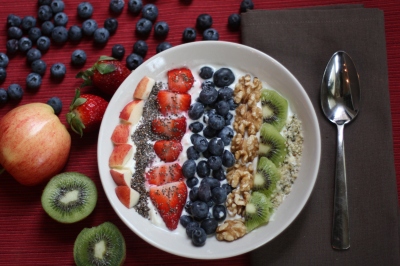“Do not make your stomach a graveyard for animals.” -Hazrat Ali AS
Picture this: it is the month of Ramadan, your stomach is growling, and you’ve been fasting for the past 16 hours. The sun is setting so it is finally time to break your fast at the Iftar meal. And since you are so hungry and overwhelmed by the spread of samosas, bread, fried chicken, and the large display of sweets in front of you, you cannot help but to overindulge in it all. “After all, I do have to fast for 30 entire days…” you reassure yourself. But by the time Isha (night prayer) andTaraweeh (extra, voluntary prayers) roll around, you’re too full and lethargic to properly focus on the prayers, leading to guilt, anger, and disappointment in yourself for your unhealthy eating choices and bad habits, which, regrettably, manifest into your Ramadan routine, year after year after year….
Allah (Subhanahu Wa Ta’ala, the Exalted) states in the Holy Qur’an “O you who believe, fasting is prescribed for you, as it was prescribed for those before you, so that you may guard against evil.” (Qur’an 2/183).
The month of Ramadan is not a cyclical antithesis between starvation all day and binge eating all night. Instead, Muslims are given this month as an opportunity to change for the better, not only for one month but, for the rest of our lives. This is a Muslim’s ‘New Year’s Resolution’ to replace the bad with the good: to learn to control our tempers, our tongues, our desires, and to instead focus on becoming more tolerant, patient, and benevolent human beings. Ramadan is a training process that teaches us humility, as we face the same hunger and thirst as our fellow human beings in poverty-filled conditions. Ramadan enables us to become spiritually stronger and more disciplined, as we fast, not only with our stomachs, but also with our tongues, hearts, and minds, ridding ourselves of ill feelings, desires, and thoughts.
Fasting thus, as the cardinal tool of Ramadan, allows for a healing process to occur, a detoxification of mind, body, and soul. Our dietary habits should also reflect this: we should be able to exercise self-control against unhealthy eating and living habits which otherwise only hurt the progress that we could be making this month and onwards. We should establish healthy eating habits that will allow for us to become stronger, healthier, and more active human beings and Muslims. Habits that will help us to partake in the voluntary prayers during Ramadan and otherwise, to volunteer our precious time in helping others (whether our family members, friends, or people in need of our volunteer services), and to live, study, and teach the true essence of Islam, every single day.
I have compiled a list of a few tips which I hope will be beneficial for you on your journey towards better health, during Ramadan and beyond, InshaAllah (God willing).
Ten Ways to Establish Healthier Eating and Lifestyle Habits During Ramadan
1. Prepare for the month of Ramadan
One cannot simply jump into the disciplined routine of Ramadan without being prepared for it first. For example, it was the Sunnah (tradition) of the Prophet Muhammad (peace be upon him) to fast often during Shabaan (the month preceding Ramadan). In fact, he would fast more so during Shabaan than any other month (save for Ramadan itself). Fasting during the month prior to Ramadan will also allow one to be physically and mentally prepared for the obligatory fasts of Ramadan and allow one to have established a healthy routine by the time these obligatory fasts do come around. After all, just as the student studies to prepare for an exam, Muslims that prepare for Ramadan during Shabaan will also benefit greatly.
2. Do not skip the suhoor (pre-dawn) meal
Another Sunnah of the Prophet, he always made sure to eat something during suhoor, even if it was simply a glass of water and a few dates. He is stated to have said “Have suhoor, for in it there is blessing (barakah).” (Al Bukhaari, 4/139). Do not sleep through it, ensure that you wake up on time to eat this meal, otherwise you will be doing your mind and body a disfavor (due to an inability to focus on daily activities because of the hunger pangs, thirst, and exhaustion that missing suhoor inevitably causes). An easy and portable option is a smoothie,which can even be prepared before bedtime. Simply fill your blender with a liquid base (coconut water, milk, etc) and add a banana, 2 tablespoons of peanut butter, half a cup of oats, a few dates, and honey to sweeten. Not only does this smoothie include many of the foods mentioned in the Qur’an and in Hadith (sayings and teachings of the Prophet), but this complex carbs, protein, and fiber-rich meal option will provide you with long-lasting energy to sustain you throughout the day.Other suhoor meal ideas include omelets (filled with vegetables and a side of fruit) and oatmeal (filled with grains, seeds, nuts, fruit, and greek yogurt).


3. Meal Prep
Prepare your meals ahead of time, make more than you require, and store the extra meals in the freezer. Then, simply thaw and reheat as needed. Also, one day during the week, cut up all of the necessary ingredients and store them away as well till needed. This will drastically reduce time spent in the kitchen and give the chef of the house the opportunity to fast normally with everyone else without having to slave away in the kitchen all day. It will also give you control over the food consumed by you and your loved ones, by eating homemade and healthy meals rather than resorting to the convenience and ease of fast food.
4. Eat more fruits and vegetables and stay hydrated
During the long, hot month of Ramadan, there is nothing more hydrating and refreshing than consuming (nutrient and water-rich) fruit and vegetables. It is as simple as throwing frozen fruit, leafy greens, and a protein source (such as nut butters, seeds, or greek yogurt) into a blender along with a liquid base, to create an energizing smoothie for suhoor. For iftar, break your fast with a salad made of hydrating ingredients (cucumbers, tomatoes, peppers, spinach) or a bowl of fresh melons and berries. Drink plenty of water alongside these meals to prevent thirst and dehydration.

5. Substitute healthier ingredients of traditional Ramadan dishes
For example, use olive oil instead of butter, Greek yogurt for cream and mayonnaise, herbs and spices in place of salt. Bake, grill, or broil your favorite dishes instead of frying them. And reduce the amount of the unhealthy ingredients (perhaps a tablespoon or two of oil, if a recipe calls for 1/2 a cup). There are plenty of recipes floating around the Internet and this is also a great opportunity to be creative and play around with your favorite recipes!
6. Practice mindful eating
It is important not to overfill the stomach during the month. As is the case with everything, including Ramadan, maintain moderation! It is easy to feel that we need to laden our bodies with tons of food (during the suhoor and iftar meals) in order to function throughout the day. However, eating this way leads to lethargy, fatigue, and laziness instead of allowing us to remain strong and energized. As one learns throughout this month, we don’t need to overeat to feel satisfied, full, and content. Following the way of the Prophet, try to “fill the stomach with 1/3 food, 1/3 water and to leave 1/3 empty”. However, if you still feel hunger after you’ve eaten your meal, wait 15-20 minutes to see if the hunger persists, since it takes about that time span for the brain to process fullness and satiety.
7. Stay active (spiritually, mentally, and physically)
Do not use this month as an excuse to lounge around all day. Remember, this month is about self-discipline, changing your bad habits into good ones, and renewing your spirit. So use this month to volunteer more during your free time, as charity is highly encouraged, even more so during this month. Exercise more, even light exercise can help to maintain energy levels and keep your spirit up, especially since you are not consuming food during the day. And most importantly, be sure to engage in short but consistent Islamic practices everyday. Read a little bit of Qur’an daily. Listen/watch Islamic lectures online. Consistency is essential for establishing long-term habits, not just changes that end when Ramadan does.

8. Bring the healthy dish to social gatherings
There will be an abundance of iftaar parties/potlucks, offer to bring a healthy dish (perhaps a salad, mixed fruit, baked fish/chicken) so that you won’t be tempted to overindulge in the many unhealthy options there. Plus, it will be more socially-acceptable and polite than bringing and eating a container of fruit and vegetables all by yourself (guilty).
9. Have a participating support system
Make these healthy changes together, not just by yourself. Transitions are easier to make if a person has a support system of family and/or friends that will actively participate in the changes as well. Together, you can create healthy dishes, go on walks, participate in volunteer efforts, and have invigorating conversations.
Sadly, for a lot of new Muslims, Ramadan is an especially difficult period. Since their family members tend to be of non-Islamic faith, new Muslims spend the month alone, eating alone and praying alone. It is up to the Muslim community to welcome their new brothers and sisters in with open arms and to include them in events and activities. Support groups can also be found in many communities that will give new Muslims the guidance and support they need (Here is one such group: http://www.newmuslimcare.org/).
10. Practice Sadaqa, the essence of Ramadan
“Ramadan is a blessed month of reflection, prayer and fasting for Muslims. During the month, observers gain a better understanding of and appreciation for the suffering of impoverished and hungry people around the world. Ramadan also serves to remind Muslims of the importance of charity, and their obligation to be charitable during the month and all throughout the year.”
-Islamic Relief USA (http://www.irusa.org/campaigns/ramadan/)
Unfortunately and ironically, there is also a lot of waste and extravagance during Ramadan, especially in the West, where there is an insatiable need for throwing opulent Iftar parties filled with an abundance of food that gets thrown away. In the true spirit of Ramadan, offer to take leftovers to donate to food drives in the community. Or better yet, start one yourself! Keep food baskets in the masjid. Donate to local food banks or to homeless shelters in the community. Encourage your family members to be involved in these efforts, especially children and have them volunteer at soup kitchens and food banks to teach them the value of food and the spirit of Ramadan. All of this will count as Sadaqa (voluntary charity), InshaAllah.
Through establishing and maintaining these healthy dietary and lifestyle changes, we ask Allah to accept our efforts and guide us in living healthier, longer, and more productive lives, as Muslims and as human beings, InshaAllah.


Reblogged this on Dpressedmuslimah.
beautifully written article!
JazakAllah!!
Reblogged this on The East Street.